how to install Visual Studio
Installing & Configuring with Visual Studio
There are 2 ways to install OpenCV into your computer. But for a beginner, the most suitable way is the installation by using the pre-built libraries. So, I am going to discuss how to install OpenCV by using pre-built libraries.
First of all you should have a suitable IDE. I installed Visual Studio Express 2012 which is a free edition. (You will need to register by giving your email address to obtain the free product key).
Then you have to download OpenCV from here. You can choose whatever version, you want. I choose OpenCV 2.4.5.
Then double click the downloaded 'OpenCV-2.4.5.exe' file and it will be extracted to whatever location, you give. I gave C:\ as the extracting location.
Then you will need to set up environment variables correctly to be able to use OpenCV.
Steps to Set up Environmental Variable
- Right click on 'My Computer' and click 'Properties' in the drop down menu. You will see a window like this.
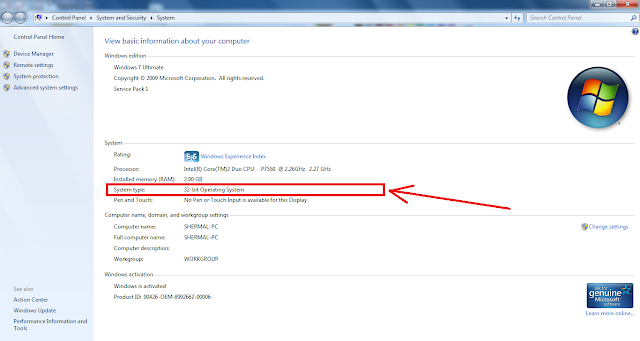 |
| Find Bitness of a Computer |
Here the System type is 32 bit operating system. So the system architecture is x86.
If the system type is 64 bit operating system, the system architecture is x64.
Both Visual Studio 2012 and OpenCV2.4.5 supports vc11. So, in this tutorial, I am going to use vc11 as the compiler type. You can find supporting compiler types of OpenCV, if you go to C:\opencv\build\x86 or C:\opencv\build\x64 according to your system architecture.
Remember your system architecture and expected compiler type because you will need this in the middle part of this post.
- Now you are ready to set the environment variables. This can be done in the command line or by using GUI. I am going to explain the GUI method.
- Right click on 'My Computer' and click 'Properties' in the drop down menu. You will see a window like this.
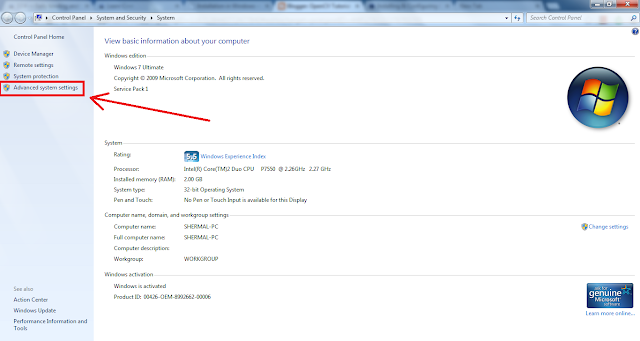
- Click 'Advance System Settings' in the above window
- Then click 'Environment Variables'
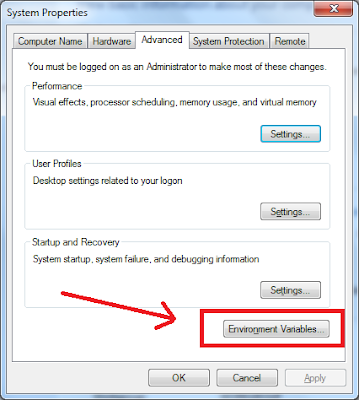
- Then click 'New' button at the bottom of the window
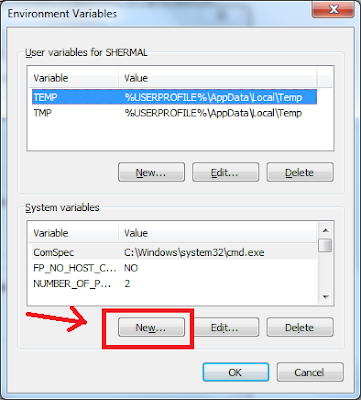
- Type OPENCV_DIR against Variable name:. And type the location C:\opencv\build\ against the Variable value:.
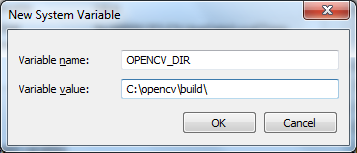
- Then press OK
Now you have added a new environment variable to the system.
Now you are going to edit a system variable.
- click 'Path' or 'PATH' inside the list of System variables and then click 'Edit' button at the bottom of the window
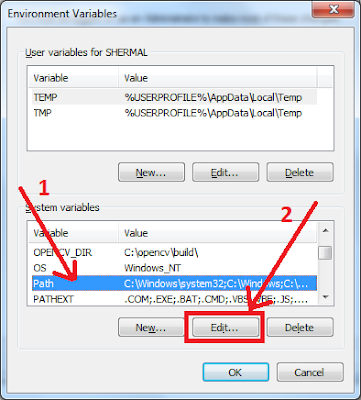
- Then add a ; to the end of the line and add the following %OPENCV_DIR%\x86\vc11\bin after the semicolon. x86 is your system architecture and vc11 is the compiler type. How to find your system architecture and compiler type is explained at the beginning of the post. (Don't delete anything. Just append it at the end of the line.)
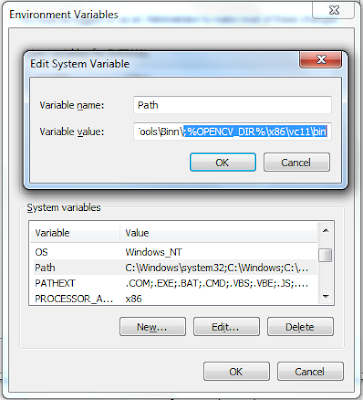
Hooray!! You have completed the installation of OpenCV. Next thing you have to do is configuring Visual Studio.
- Start Microsoft Visual Studio
- Go to File>New Project...
- Do everything as shown in the below image and click OK and then click Finish.

- Press 'Ctrl' key and then 'W' while holding the 'Ctrl' key in your keyboard. Release both keys. Then press 'S' in your keyboard. Then you will see the 'Solution Explorer' pane in your right or left side of the Visual Studio window. In my case, it is in the right side.
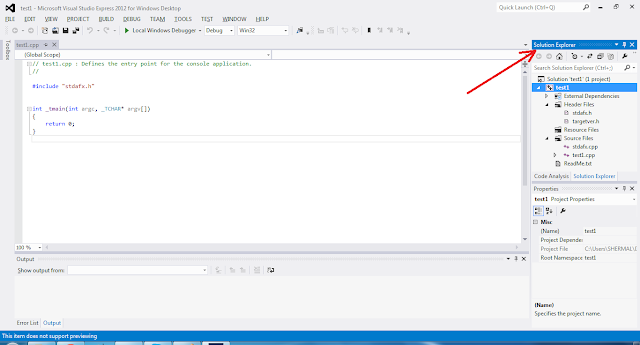
- Then right click on the project name (you have entered this name in a previous step) and then click 'Properties'
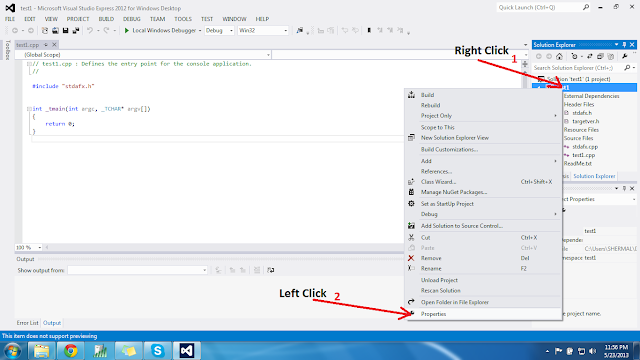
- Choose 'All Configurations' as indicated in the 1st box. Click the 3 places as pointed by next 3 boxes in the given order. Then copy and paste $(OPENCV_DIR)\include against the 'Additional Include Directories'
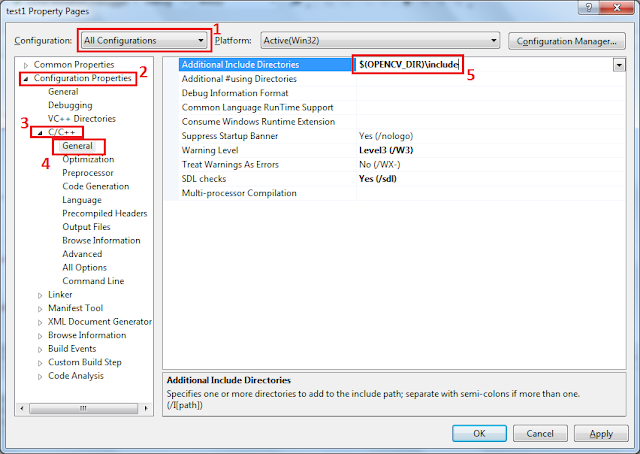
- Click the first 2 places as pointed by first 2 boxes in the given order.Then copy and paste $(OPENCV_DIR)\x86\vc11\lib against the 'Additional Library Directories'
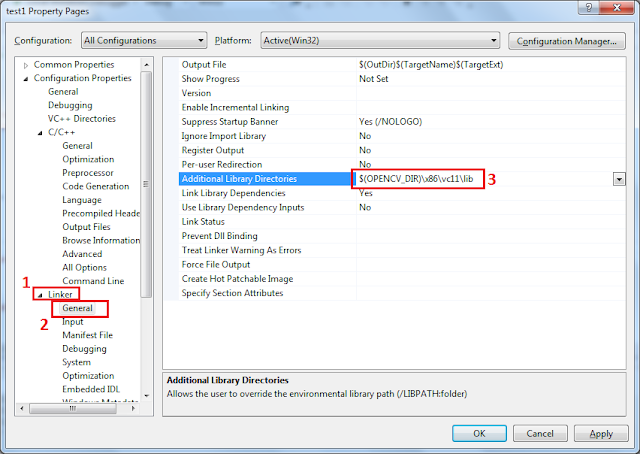
- Click as illustrated below
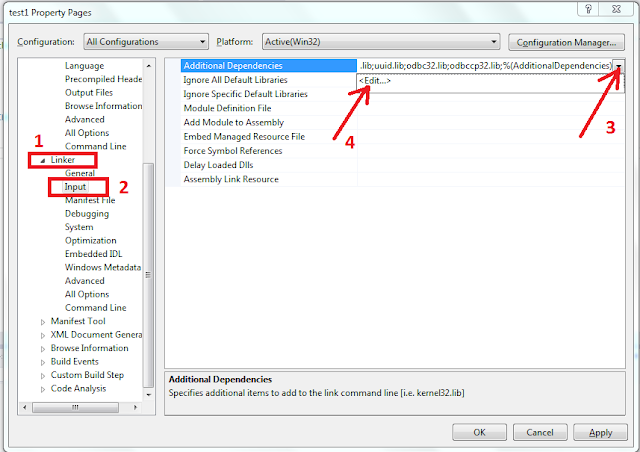
- After you click the <Edit...> (4th arrow in the above image), dialog box will appear and you have to copy and paste following library file names. If you are using a different version of OpenCV other than 2.4.5, please check the 'C:\opencv\build\x86\vc11\lib' location for respective file names.
opencv_calib3d245d.lib
opencv_contrib245d.lib
opencv_core245d.lib
opencv_features2d245d.lib
opencv_flann245d.lib
opencv_gpu245d.lib
opencv_haartraining_engined.lib
opencv_highgui245d.lib
opencv_imgproc245d.lib
opencv_legacy245d.lib
opencv_ml245d.lib
opencv_nonfree245d.lib
opencv_objdetect245d.lib
opencv_photo245d.lib
opencv_stitching245d.lib
opencv_superres245d.lib
opencv_ts245d.lib
opencv_video245d.lib
opencv_videostab245d.lib
These are some of the file names, you can find in the 'C:\opencv\build\x86\vc11' location.
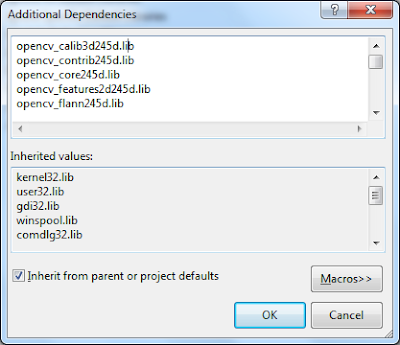
Now click OK
Comments
Post a Comment